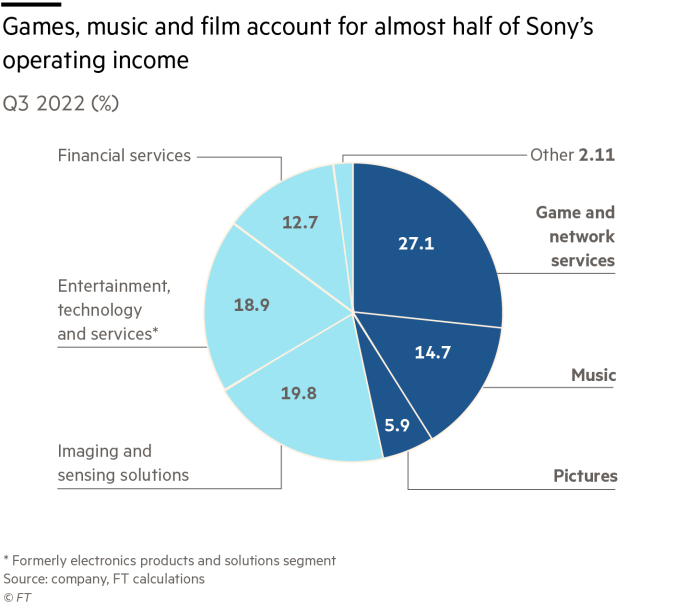
If your world revolves around the fate of Joel, Ellie and the Fireflies, it probably means one of two things: either you are addicted to the post-apocalyptic television series The Last of Us or you are a financial analyst with a “buy” rating on Sony.
Either way, there are nail-biting weeks ahead, especially for chief financial officer Hiroki Totoki who will officially be put on track to head the Japanese group when he takes over as president this spring.
For long-term Sony watchers, The Last of Us symbolises the culmination of a decade-long metamorphosis. It is a corporate transformation carried out under two successive chief executives and set to be entrusted to a third, with Hiroki’s promotion seen as the latest step before he eventually inherits the top job.
This process, which veteran Sony analyst David Gibson at MST Financial describes as “remarkable”, has steadily converted Japan’s best-known consumer electronics brand into a less well-understood blend of specialist-hardware maker and international media giant.
“It has focused on being really good at a few things, rather than trying to be average at a lot of things,” said Gibson.

It is the focus on the media business, say analysts, that defines the new Sony, a company that has built globally significant positions in a broad range of entertainment genres at a time of wallet tightening and as the battle between rival streaming services intensifies.
In the first nine months of the financial year ending next month, 48 per cent of the group’s operating profits came from games, music, films and television. Analysts expect that ratio to climb to more than 56 per cent in the financial year that ends in March 2024.
Those same analysts, traditionally obsessed with Sony’s TV sales and fluctuating competitiveness in mobile phones, must now comb media news for reviews of Spider-Man movies, the buzz around trailers for TV shows based on Sony games and the record-breaking streaming numbers of Mariah Carey’s hit song “All I Want for Christmas Is You”.

Among Sony’s strongest new suits is its globally dominant position in the distribution of Japanese anime cartoons — a business that has been significantly expanded both financially and geographically by the advent of streaming services.
Bolstered by the $1.2bn purchase of AT&T’s anime streaming service Crunchyroll in late 2020, which now has 10mn paid subscribers, the group has built what is generally understood as the world’s largest portfolio of anime.
As a result, Sony has adopted an “arms dealer” strategy — distributing titles across multiple rival streaming platforms to maximise profits.
“In terms of owning the IP and distribution for animation, Sony owns most of them,” said Jefferies analyst Atul Goyal. “They’re making all the right moves in video games, animation and TV. They are now essentially a media company.”

Sony’s anime strategy has evolved at a crunch moment. During the pandemic, according to figures produced by the Association of Japanese Animations, Japanese anime spread more extensively to audiences outside Japan.
The most recent figures available in 2021 show the global market for Japanese anime grew to a record high ¥2.7tn ($20bn). Estimates produced by SkyQuest Technology Consulting, and used by several Sony analysts to inform their own forecasts, suggest that the global anime market is now growing at about 10 per cent a year and could reach a value of $47.14bn by 2028.
More importantly, however, the market outside Japan represented ¥1.3tn of that 2021 total. In the intervening months, say analysts, the balance will have shifted definitively in favour of the global market and, for the first time, anime will make more money overseas than in its domestic market.
But The Last of Us, said Macquarie analyst Damian Thong, marks an important next step in the transformation, in which Sony is able to leverage its different media businesses to better profit from its intellectual property.
The Last of Us was first launched as a 2013 PlayStation game from one of the company’s in-house studios, around the time the campaign to reinvent Sony began.
The title became a broader games franchise that sold 37mn copies — a fan base that guaranteed a significant global audience for the show, even before it had been made. The TV show, currently being streamed by HBO in the US, was described by Thong in a note to clients as “possibly the best-ever video game adaptation for television or cinema”. Others have dubbed it “Sony’s Game of Thrones”.
The effect of its success, he added, would now raise expectations for the future TV outings for the many other blockbuster games titles that Sony’s own studios have produced. These include Horizon Zero Dawn, which is being produced for Netflix, and God of War for Amazon Prime Video.

“Now, Sony probably takes a piece of my spending every time I listen to a Clash song or watch The Boys on Amazon,” said longtime Sony-watcher Pelham Smithers. “If I were a Spider-Man fan, they’d probably take a small fortune off me this year, with all the Spider-Man universe product out across film and games.”
But Smithers sees plenty of areas of risk for Sony. Its shares, though more than 10 times higher than they were at the start of the transformation process in 2013, are now 21.5 per cent lower than they were at the end of December 2021, when the stock reached a 21-year high. The fall follows concerns that chip shortages were delaying the rollout of its flagship PlayStation 5 console and that consumer spending on games generally would fall post-pandemic.
It is against this background that Totoki will be promoted to president and chief operating officer from April. Among investors, the 58-year-old finance chief had long been considered the natural successor to chief executive Kenichiro Yoshida, with the duo playing a pivotal role in stemming a decade of losses at the group’s consumer electronics businesses.

Totoki, a maverick known for his role in setting up Sony’s online banking business, has already signalled that he will implement Yoshida’s overall strategy. But while the group is forecasting record revenue for the current financial year, Totoki will be tasked with navigating a slowdown in the global economy, geopolitical risks and climate challenges.
“I feel a strong sense of crisis that we are on the brink of whether we can take advantage of the rapid advancement in technology . . . to drive further growth or face disruption,” Totoki said at a news conference this month.
Minami Munakata, an analyst at Goldman Sachs, said she expected the transformation process to continue under Totoki and that operating profits from the combined entertainment businesses would account for 61 per cent of the total in the 2026 financial year.
“We believe investors are aware of that transformation, so one of the major debates is how to value the company,” she said.
Although there is ample opportunity for more The Last of Us-style synergy between divisions in the future, Sony has still been slow to unleash that. MST Financial’s Gibson says the company risks being left behind because of its legacy businesses.
“Prior CEOs have spent billions on small R&D projects and ideas, looking for the next big thing or the next Walkman,” he said. “Innovating for a $120bn company that is material is very hard.”







